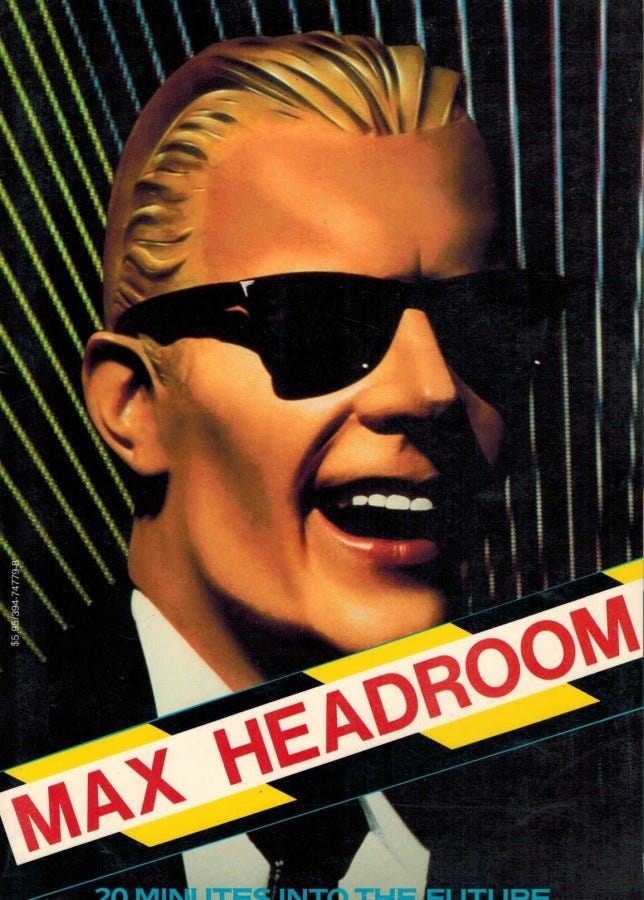Max Headroom Episodes 2 and 3
A double dose of Max Headroom episode reviews, both dealing with topics still relevant today.
This week, I’m sharing two episode reviews of the Max Headroom series. They are from my former website but I have added additional thoughts, reflecting on how society has evolved since these reviews were first written.
Episode name: Raking
Premise: Theora Jones' younger brother Sean is caught up in raking, a youth sport with a violent twist.
Theme explored: The main focus of the episode is how violence is used to exploit youth. The episode revolves around raking, a sport in which youth use motorized skateboards and attempt to knock each other down, but is exploited by adults and turned into a spectacle in which youth are encouraged to injure each other and bets are placed as to who will survive.
But the critique doesn't stop with a sport that's turned violent -- throughout the episode, Max Headroom is asking questions about a show called Missile Mike (a clear reference to Rambo) that is considered "children's programming" on Network 23, which happens to be negotiating for the rights to broadcast raking events (along with its primary sponsor, Zik Zak, agreeing to sponsor events). It raises the issue about how media companies seek programming to draw viewers without always considering whether it's appropriate for a particular audience or something that should even be aired to begin with.
Max Headroom quotes:
"Is fond the same as fondle?"
"The kids like killing? Who told them about it?"
"I'm looking for something with action, excitement and taste -- a taste of blood."
"Do you know that in Chinese, there are 30 different ways of saying one word? Is that why their population is so big? Chinese men just don't know when to take no for an answer."
Personal observations: Another episode with a theme that is still relevant today -- violence and its impact on not just youth, but all people, is something we still struggle with today. That many of the most popular movies, shows and video games today are violent in nature begs the question about how far media should go in using violence to appeal to audiences.
Additional thoughts several years later: Though the theme primarily focuses on violence in entertainment, there are other ways to look at this issue.
What exactly should be part of children's programming? In what other ways do the media exploit youth? Or exploit people in general? What is the price we pay with, for example, reality TV programming?
Episode Name: Body Banks
Premise: Edison Carter investigates the disappearance of a young woman, which leads to the discovery of a body bank involved in organ theft.
Theme explored: The episode focuses on medical technology and questions how far one should go with it. In this case, a wealthy individual pays a large sum to a body bank for a pituitary gland to save his mother's life and insists it be found at any cost. It leads to the body bank declaring that if it cannot find a matching organ from a dead person, it will extract one from a living person -- in this case, a person in the lower class. The question that is asked: If saving one person's life must mean taking another's life, is it worth it?
Along with the plot involving the young woman's disappearance -- a kidnapping in which her organs are sought to save a wealthier person's life -- a member of Network 23's corporate board is blackmailed to acquire the technology that made Max Headroom possible to save the mind of the wealthier person. This not only furthers the theme about how far one should go with medical technology and who benefits from it, but touches upon bribery and corruption among the wealthy. This is further explored, to an extent, in a subplot in which Network 23's executive board attempts to get Max Headroom to become a spokesperson for the Zik Zak Corporation when Max has his own ideas about being a spokesperson.
Class warfare is also touched upon -- those who benefit are the elite and well connected while those who are exploited are described as the "fringes" of the city, which is another way of describing those in the lower classes who don't have the connections or resources those in higher classes do.
Max Headroom quotes:
"They're interested in me? They want an audience -- I'm like an audience."
"Zik Zak, the corporation that makes you give your money away the nicer way."
"Forget what I said about those Zik Zak burger packs. Don't go for your wallet -- that's just what they taste like!"
"Asking is just polite demanding."
Personal observations: Debates regarding medical care, ranging from who really gets access to life-saving treatment to how far we should go in exploring new medical achievements (stem cell research is a good example), haven't gone away in today's society. The question posed about "whose life matters more?" is one we must keep asking ourselves as well, especially when the question comes down who happens to have better access to medical care.
Additional thoughts several years later: I should explain what a "body bank" was in the TV series. It's a dystopian version of a morgue, in which those who run it will sell body parts of dead people, often so they can be used to benefit other people. (Another way to think of it is "organ donation without permission.")
The "whose life matters more" question regarding medical care is still relevant today. As for exploring new medical achievements, we can see this in issues ranging from gender affirming care to the COVD-19 pandemic. In such cases, though, some of it may have less to do with "who benefits" and more to do with "is there really a benefit?"

